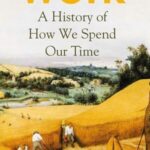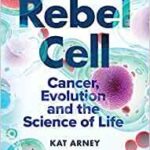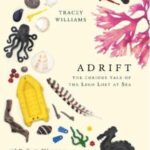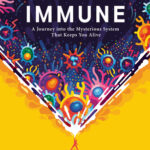This week’s theme from Top Ten Tuesday is about weird or funny things you’ve googled thanks to a book. I couldn’t think of many weird or funny things I’ve put into a search engine due to a book. I was tempted to google about the scene with the rice wine in volume four of The Scum Villain’s Self-Saving System — I’m not surprised it’s a thing, but would it have helped?! (If you know, you know. I’m saying no more. I advise against googling it if you’re not in the know, and definitely don’t do so on a work or school computer.)
Anyyyyway, moving on from that, I decided to just discuss ten times I looked up more information because of a book! Note that these don’t necessarily constitute recommendations of the book, just times I enjoyably got my nerd on and dug in!
- The Notebook, by Roland Allen. This one’s fresh in my mind since I just finally put up the review: I found myself searching for more info about ICU patient diaries, because I hadn’t come across it at all and I think it sounds like a really helpful concept. And indeed, it is a thing, and the research suggests it helps a lot!
- Work: A History of How We Spend Our Time, by James Suzman. The feathers of a peacock have been widely cited as an example of sexual selection in birds, but Suzman suggested this isn’t true. So far, I haven’t been able to find sources backing him up, though I admit I forgot to check whether he included a source for this.
- Christmas: A History, by Judith Flanders. I googled a lot to find her sources, which eventually a question to her revealed on her website. I went on a whole journey with this one, discussed in my review: she seems to have quoted previous scholarship which I consider to be pretty fundamentally flawed.
- Rebel Cell, by Kat Arney. This one had me googling a few things, one of them being contagious cancers. It’s amazing how when you google this, you get repeatedly assured that cancer is not transmissible, but in fact it is. That’s frightening and unpalatable, but heyho, it’s the truth. It’s mostly attested in Tasmanian devils (transmitted during fights) and in dogs (transmitted sexually), rather than in humans, but unfortunately it has been reported occuring in recipients of organ donation.
(While HPV can ultimately cause cancer and is transmissible, it isn’t transmission of the cancer itself. That said, quite a number of viruses can be implicated in the development of various human diseases including cancer, and we should in general get our vaccines and take all the preventative measures we can.) - Overkill: When Modern Medicine Goes Too Far, by Paul Offit. The author discusses a lot of common medical interventions and the evidence that suggests they have, at best, no benefit — and at worst cause unnecessary suffering. Those are big claims, and the author knows it, so he provides details of how to go to the primary sources for yourself. I still have stuff I want to dig in on further from this one! I can’t pick an example here, it was all fascinating.
- Adrift: The Curious Tale of the Lego Lost at Sea, by Tracey Williams. I read quite a bit about Lego’s sustainability efforts after reading this one, which is about Lego shipments lost at sea and how they end up on beaches. It seems that Lego had to abandon its efforts to make bricks from recycled plastic bottles, because it was ultimately going to cause a bigger carbon footprint.
- An Immense World, by Ed Yong. I grabbed a search engine for a lot of things here, just to read more, e.g. about the eyes of scallops. They have little mirrors made of guanine (a nucleic acid used in DNA) in their eyes — whaaaat?
- The Good Virus, by Tom Ireland. Did you know that bacteriophage therapy is actively being used in Georgia? It involves using viruses that infect bacteria to control bacterial infections, if you’re not familiar: as Tom Ireland discusses, it may well be a way we can handle antibiotic resistance. I knew about bacteriophages and the theory of using them to treat actual infections. I had no idea it was actually in use.
- Immune: A Journey into the Mysterious System That Keeps You Alive, by Philip Dettmer. If you are curious about the immune system, I really recommend this one. And I learned new things from it myself, even though I’m doing my MSc in infectious diseases, so know a fair bit about immunology! The bit I loved was learning that neutrophils sometimes create sticky nets using their own DNA and extrude them to capture and do damage to pathogens: neutrophil extracellular traps (NETs). Here’s the Wikipedia page for something a bit less technical… or you could read the book, which explains things beautifully for laypeople.
- Kindred: Neanderthal Life, Love, Death and Art, by Rebecca Wragg-Sykes. I loved this one, and there was so much worth searching up and learning more about. Consider the fact that Neanderthals (widely assumed to be rather stupid compared to us) had complex methods for making glue.
I would recommend most of those books, minus #2 and #3, on balance. So if any of that sounds fascinating, you probably know where to start!











The Notebook sounds really interesting.
Here is our Top Ten Tuesday.
I really liked it! It’s a bit rambly at times, and not all chapters were equally interesting, but I very much enjoyed it.
I will not be googling rice wine from that book. Haha.
Kindred and The Good Virus were both excellent reads.
Thank you for stopping by earlier.
I would not recommend it! Reading the book was an eye-opening moment, ahaha. At least it doesn’t have to be enshrined in my Google search history too!
I am eager to read Overkill now. It would be better if doctors were allowed to prescribe placebos or chicken-soup-in-a-pill, I think.
Unfortunately quite unethical, but it’s unfortunate that doctors find it so difficult to say no…
Ooooh lots of interesting books here. Super interested in the Lego book. The cancer book sounds TERRIFYING.
I actually found Rebel Cell surprisingly reassuring! It suggests that we handle cancer wrongly in a lot of ways, but it’s not beyond our abilities to shift how we think about it and change treatments to really get to grips with it.
I find science books have a bad habit of adding to my science TBR!
Yep… one book just leads to another. I often check bibliographies just to add stuff to my TBR.
It was very interesting to see what these books had you looking up and learning.
Haha, glad to be of service!
They sound like interesting books. Medical facts fascinate me!
Have a great week!
Emily @ Budget Tales Book Blog
My post:
https://budgettalesblog.wordpress.com/2024/03/05/top-ten-tuesday-books-that-made-me-ask-questions/
Me too! Always so interesting.
That’s an interesting way to go. Have a great week!
Thanks for dropping by!
Wow, these are all so fascinating and it makes me want to read all the books you’ve mentioned. I’m totally blown away by the revelation that cancer is transmissible, I really have to read this one! I’m also very, very curious about the rice wine thing and I’m contemplating just jumping into volume four of the series just to find out what you mean!
Haha, I wouldn’t recommend that! Not because book four is bad (though the rice wine chapter is a bit… uhhh). But there’s a lot of lovely build-up to the relationship and context that you’d need for book four, which mostly fills in holes that the main timeline couldn’t address without getting distracted or because certain characters weren’t involved.
I sat this one out. Since so much of my reading is non-fiction – and often Victorian crimes/murder, true crime, and big crimes, my search history is basically also all about murder lol
Hahaha, I get that. Sometimes I think some of my writing research search history has me on a list somewhere. 😛